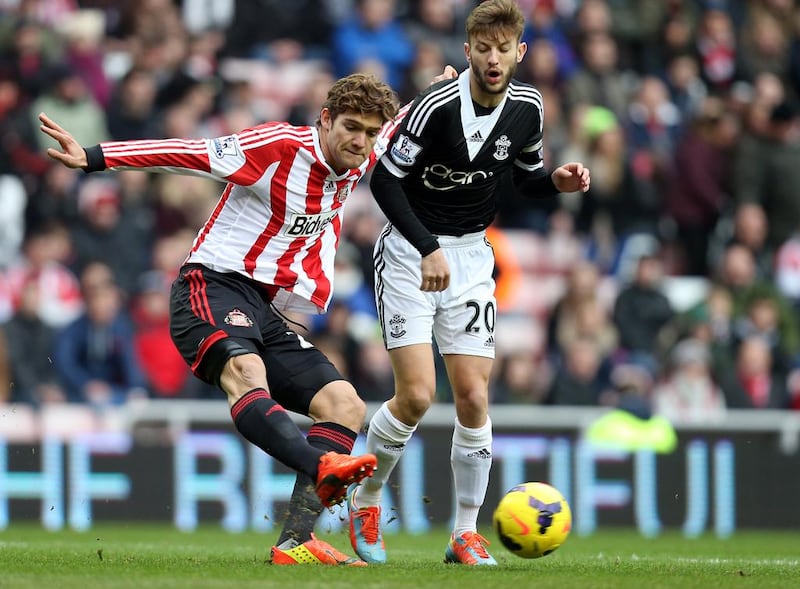Anybody who joined Sunderland in the January transfer window would be entitled to regard himself as a lucky charm.
At the end of December the club squatted at the bottom of the Premier League table. They had won once in eight matches and sacked a manager, Paulo Di Canio, barely seven months after hiring him. They seemed doomed and desperate.
After results in January the mood altered dramatically, although when Marcos Alonso Mendoza, the left-back, received an approach from the club for a mid-season move, he would have been forgiven for hesitating.
Alonso was at Fiorentina, a Serie A club in contention for a Uefa Champions League place next season; he knew intimately what a relegation struggle in English football could feel like. He suffered the drop with Bolton Wanderers 18 months ago. He had left English football to advance from the second-tier Championship. The invitation he now had was to help a club avoid demotion, under inauspicious circumstances.
He said yes. The 23-year-old Spaniard needed game time, having struggle to establish a first-team place at Fiorentina since joining them in July. He is on loan at Sunderland, and three weeks into the stint, has hardly looked back.
His debut for his new team? A man-of-the-match performance, according to the broadcaster of the first-leg of Sunderland’s League Cup semi-final against Manchester United.
By the end of the epic second leg, his new club had reached the final of that competition at the expense of the Premier League champions. In the denouement penalty shoot-out at Old Trafford, only three of 10 spot-kicks had been converted. Alonso’s was one of them.
Fitness permitting, he should now play a Cup final, somewhat unexpectedly, in his second English stint. That will be something to tell the family about, a possible medal to tag into the heavy catalogue of them that belongs to one of the highest-achieving sporting families in the history of European club football.
There are the Spanish league and Cup golds won by his father, Marcos Alonso Pena, who would have felt for his son in the decisive spot-kick lottery in Manchester’s Theatre of Dreams.
Marcos Alonso the elder was involved in a fabled shoot-out, one where scoring seemed even harder than the players of United and Sunderland found it 24 days ago. He was the fourth of four Barcelona men who missed from the spot in the 1986 European Cup final, won by Steaua Bucharest.
Then there’s Marcos Alonso Imaz, even more senior, the late grandfather of the Sunderland loanee. A defender of mythic toughness, and an array of distinguished medals, this Marcos Alonso, nicknamed “Marquitos”, was part of perhaps the greatest sides in the club game, the Real Madrid team who won the first five European Cups, from 1956 to 1960.
His teammates included Alfredo di Stefano, Ferenc Puskas, Raymond Kopa and Paco Gento. His immortal moment was scoring the third goal, an equaliser, in the final of the debut competition, in 1956, a 4-3 win over Stade de Reims.
An uncle and a cousin both had success on horseback, as jockeys, and given all the sportsmen in his family it is little wonder that Sunderland’s Marcos Alonso recalls that holidays as a child were filled only with talk of football.
From Marquitos, he seems to have inherited a defensive nous, a ruggedness; from his father, who was a winger who represented Spain 22 times, including at the 1984 European championship, where he won a silver medal, an attacking impulse down the flank. Marcos Alonso Mendoza is a forward-thinking full-back, comfortable operating in midfield.
He grew up through the Real Madrid academy, a privilege but also a challenge. The leap from their youth section to regular first-team football is a big one, as near contemporaries such as Juan Mata, let go by Madrid as a teenager, would testify.
Though he made his Madrid debut at age 19, under Manuel Pellegrini, the arrival of Jose Mourinho as coach and the consistency of Marcelo in the left-back position, meant he was open to a move in the summer of 2010. He joined Bolton.
His two Premier League seasons saw him in and out of the team. But in the Championship campaign of 2012/13, he was voted the club’s Player of the Year. Fiorentina took note and envisaged him adding flair to their enterprising game plan. Ousting the experienced Manuel Pasqual from the left of the defence, however, proved difficult.
Gus Poyet, the Sunderland manager, saw an opportunity. He sensed Alonso’s impatience to make a good impression.
“You can see he’s excited to be here and he’s made a great start,” Poyet said. As for the relegation scrap the player was anticipating, it has so far consisted of three league victories, a draw and one defeat.
Sunderland moved from being adrift at the foot of the table to 18th, only in the bottom three on goal difference, having played one game fewer.
They have reached one Cup final and are aiming to make it to another. The next hurdle is a last-16 tie against Southampton on Saturday.
sports@thenational.ae






